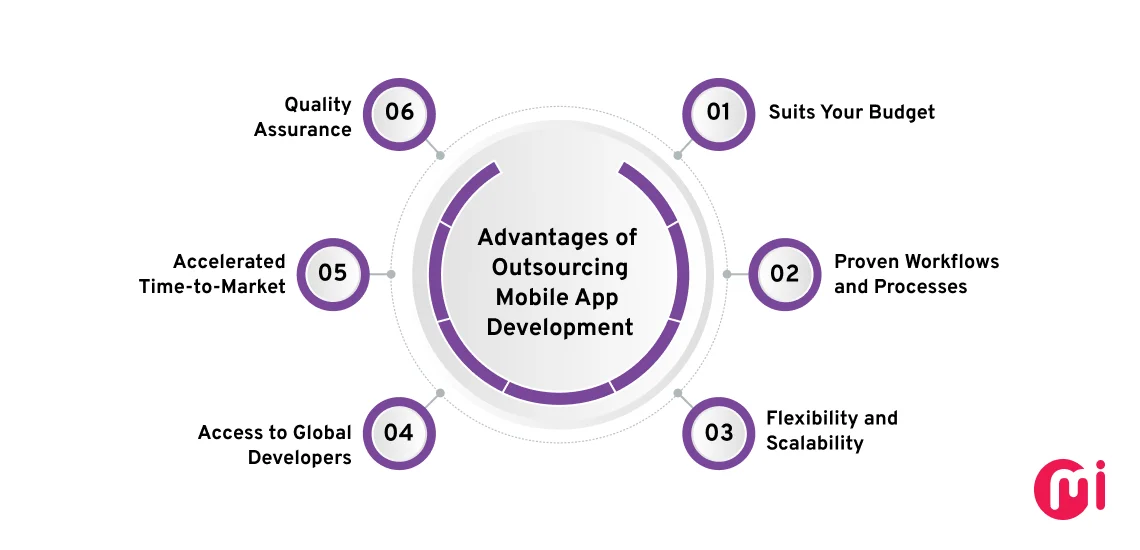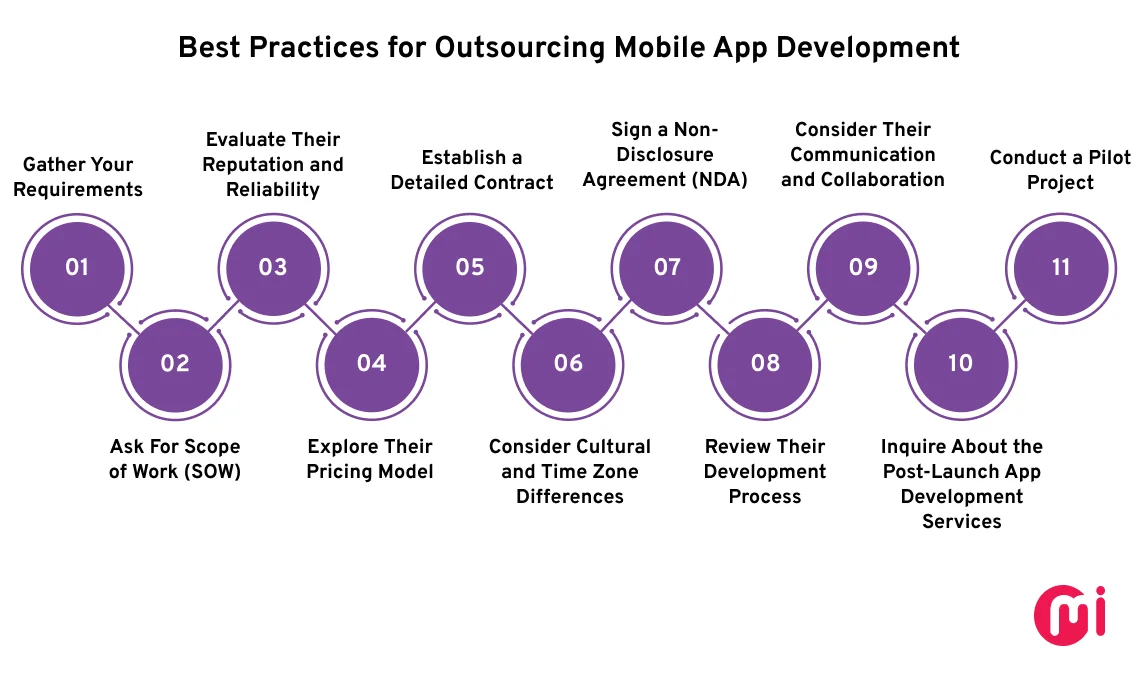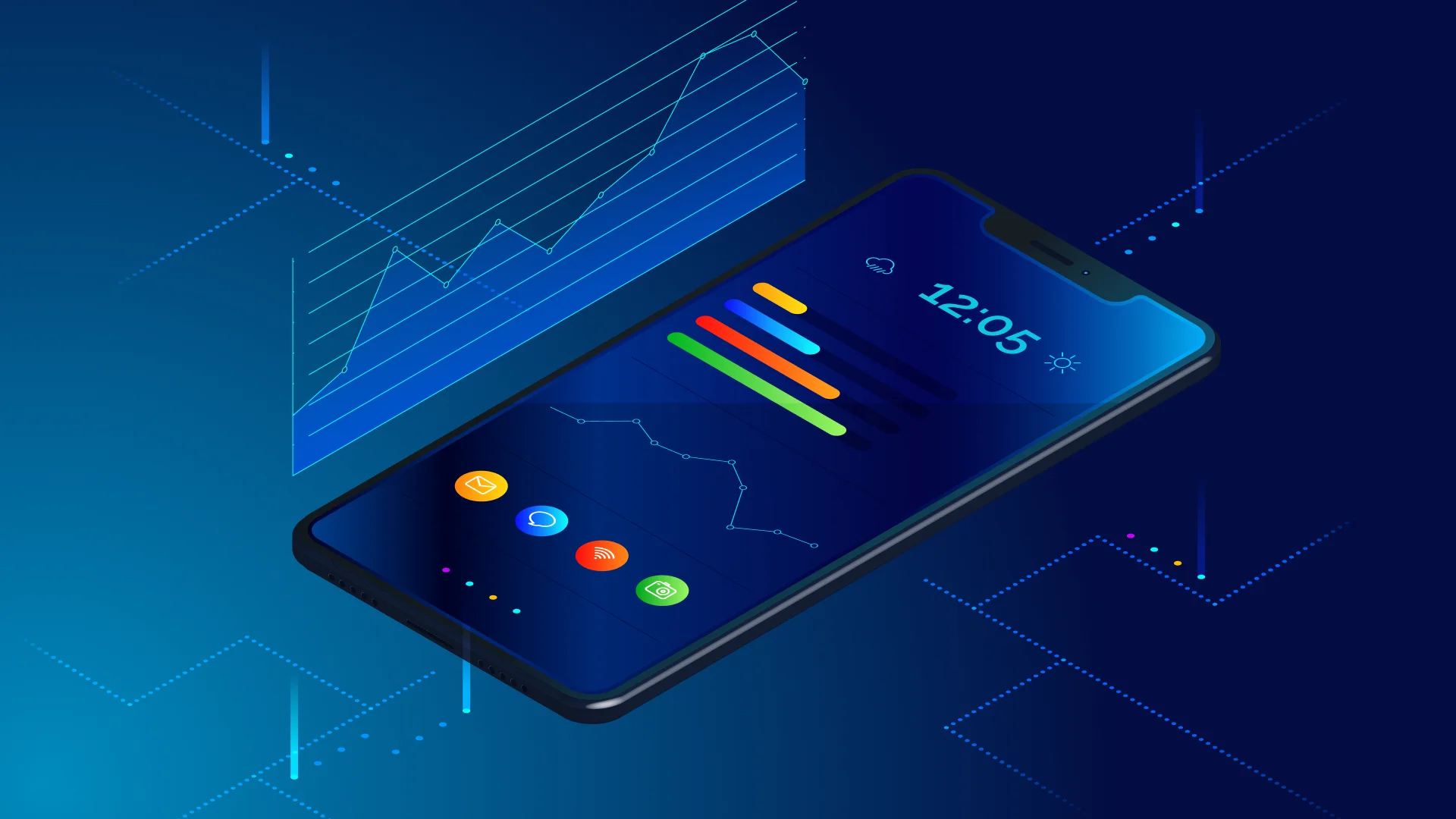How to Effectively Outsource Mobile App Development: Benefits and Best Practices
- Mobile
- October 4, 2024
Outsourcing app development can be a game-changer for businesses of all sizes, from startups to established companies, looking to streamline their development process, reduce costs, and gain access to specialized talent. This guide provides an in-depth look at the best practices for successfully outsourcing mobile app development, from gathering requirements to managing communication and conducting a pilot project. It also highlights the key benefits.
With the revenue in the ‘Application Outsourcing’ segment of the IT services market expected to reach a new peak of $124.07 billion by 2029, it’s clear that businesses are increasingly recognizing the value of efficient app development. Outsourcing app development has become a vital strategy for companies seeking to remain competitive and innovative.
This trend underscores a growing reliance on external expertise to streamline processes and enhance product quality.
However, selecting the right mobile app development offshore partner is crucial; the wrong choice can turn a potential ally into a significant liability.
Before diving into the best practices for finding a suitable mobile app development company, let’s first explore the benefits of outsourcing app development.

What are the Benefits of Outsourcing Mobile App Development?
By partnering with specialized development teams, companies can streamline their processes and concentrate on their core competencies. This collaboration not only frees up internal resources but also provides access to expert skills in innovative technologies. For many organizations, outsourcing mobile app development has become a strategic solution to tackle the challenge of accessing the right expertise without the need to assemble an in-house team.
Here we have listed more key benefits of outsourcing app developer, illustrating how it can enhance productivity, foster innovation, and ultimately drive business success:

Suits your Budget
Cost reduction or better control over expenses is one of the primary reasons why companies that are not self-sufficient or find internal development costs excessively high opt for outsourcing. It allows these companies to pay only for what they need without having to invest hundreds of thousands of dollars in salaries, employee benefits, office infrastructure, and more.
Instead, outsourcing app development to a team in countries like India or Ukraine can cut the projected budget by 30 to 40% without compromising the quality of the mobile app development.
Proven Workflows and Processes
Having handled multiple projects across various industries, outsourcing companies have had the opportunity to refine their workflows and processes over the years. This experience leads to more efficient and effective development execution, ensuring projects are completed on time and within budget.
Flexibility and Scalability
Businesses sometimes face quiet periods, during which in-house teams still need to be paid. Outsourcing gives businesses the flexibility to not only scale down the outsourced team size but also adjust working hours, allowing them to utilize developers only when actual development is needed. This approach ensures cost efficiency by paying only for the hours you need.
On the contrary, when a mobile app needs to be released within a shorter timeline, companies can scale the team up and even bring in teams from different time zones. This ensures that work continues around the clock, with a team always active, regardless of the time of day. By leveraging this advantage of outsourcing, businesses can maximize productivity and meet tight deadlines efficiently.
Access to Global Developers
When you outsource app development, you can find the right talent with the right skills at the right cost from around the globe. Beyond that, having a distributed team enables your business to keep development moving around the clock.
This is especially beneficial for startups that are not yet self-sufficient enough to maintain an in-house team of mobile app developers with specialized expertise. By outsourcing, they can gain access to developers experienced in cutting-edge technologies like AI/ML, cloud computing, and more—often from countries that offer this expertise at a rate suitable for their budget.
Accelerated Time-to-Market
Outsourcing provides significant value to businesses by offering speed. It allows companies to quickly access specialized skills rather than taking the time to build an in-house team. This agility gives businesses a competitive advantage by enabling them to launch their products faster into the market and scale their teams as needed.
For instance, if you’re looking to capitalize on a specific season’s high traffic to boost sales, outsourcing allows you to accelerate development. By simply requesting additional resources from the outsourcing company, you can scale up the team and meet your targeted launch date with ease.
Quality Assurance
In terms of salaries, tools, and training, having an in-house QA team can be expensive for businesses. However, ensuring proper functionality, performance, and security through quality assurance is critical. Outsourcing provides access to dedicated QA expertise, helping you meet this need while reducing the long-term costs associated with maintaining an in-house QA team.
With professionals whose sole focus is QA, you can be assured that most bugs and glitches are resolved before launch, preventing harm to your brand’s reputation and minimizing the costs of post-launch updates.
Also Read: Which is Better for Mobile App Development: In-House or Outsourcing?
Best Practices for Successfully Outsourcing Mobile App Development
When you outsource app development, you can choose between freelance developers or a dedicated development company. Each choice has its own pros and cons. However, opting for a development company often proves to be the better alternative due to their level of expertise and the continuous support they provide.
Here are the best practices to consider when outsourcing your mobile app development to a reputable development company:

1. Gather Your Requirements
To ensure that your vision is fully realized, you need to clearly outline the details you expect as deliverables from the outsourced team.
Well-documented requirements provide clarity about the vision you have for your mobile app. Ideas that are not documented can become vague, leading to confusion during implementation, delays, and unclear communication.
For example, if you mention developing an app that should integrate with wearable devices but do not specify which devices, you might encounter compatibility issues with the devices you want your app to work with. This oversight can result in the team missing crucial details.
The worst consequence is budget overruns.
Here are the key things to consider when gathering your requirements:
- What problem does your app solve?
- What value does it provide to users?
- Who are you trying to reach with your app?
- What are their needs and preferences?
- What features and functionalities do you want your app to have?
- What is your app’s unique selling proposition (USP)?
- How much are you willing to spend on developing your app?
- When do you want your app to be launched?
2. Ask For Scope of Work (SOW)
Once you have shared your requirements, it is time for the mobile app development company to translate them into actionable items to set the boundaries for what will and won’t be included in the project. The Scope of Work (SOW) outlines specific tasks, deliverables, detailed cost breakdowns, and timelines associated with the project. It serves as a roadmap for both the client and the development team.
Having an SOW prevents miscommunications, allows for accurate budgeting, sets realistic timelines, and ensures that both parties understand what needs to be achieved. By detailing all aspects of the project, the SOW helps avoid ambiguity and scope creep, where project requirements might expand beyond the initial plan.
Without a detailed SOW, the development team may struggle with managing the project effectively, often having to repeatedly clarify features and functionalities with the client. This back-and-forth can lead to confusion and delays.
3. Evaluate Their Reputation and Reliability
A mobile application development company’s competence and trustworthiness substantially impact the quality of the final product, adherence to deadlines, and overall satisfaction. This makes it critical to evaluate them on various criteria, ensuring that the company you are considering is reliable.
Here is a checklist of the criteria you can use to evaluate their reputation:
- Examine the portfolio to the range of apps they’ve developed
- Assess the quality of apps they have built
- Look for case studies showcasing the impact and results of their work
- Check for consistency of positive feedback across different projects
- Ask the company for references and speak with their previous clients
- Ensure they have expertise in the technology stack you need
- Evaluate their ability to stay updated with emerging technologies
- Check if they comply with industry standards
- Look for any industry awards, certifications, or recognitions
- Partnerships with recognized technology providers (e.g., Google, Microsoft) can indicate credibility
4. Explore Their Pricing Model
Different companies offer various pricing structures, including fixed- prices, time and materials, and dedicated team models.
When to Choose Which Pricing Model?
- Fixed-Price Model: This model requires agreeing on a fixed price for the entire project upfront. It is ideal for projects with clearly defined requirements and timelines.
- Time and Materials Model: In this model, you’re billed for the hours worked and materials used. It is suitable for projects with evolving requirements or uncertain scopes. However, estimating the final cost can be challenging.
- Dedicated Team Model: Here, you hire a dedicated developer or team, who are billed based on the hours worked. This model is ideal for long-term projects requiring continuous development, updates, and scaling.
Consider various factors, such as project scope, budget flexibility, and long-term goals when evaluating these models. Assessing these factors against your project’s specific needs helps you select a partner that fits your budget and offers the right level of flexibility and control throughout the development process.
5. Establish a Detailed Contract
A well-defined contract serves as the foundation for the project. It sets a clear understanding of deliverables, responsibilities, timelines, and expectations to minimize the risk of misunderstandings and disputes.
A comprehensive contract includes the following:
- SOW: App features and functionalities, project deliverables (e.g., source code, app binaries, documentation, intellectual property rights), deadlines, etc.
- Payment Terms and Conditions: Details of project cost, payment schedules, acceptable payment methods, late payment penalties or interest charges, etc.
- Intellectual Property Rights: Specifics of ownership of the source code, details of usage rights, etc.
- Confidentiality and Non-Disclosure: Clauses to protect sensitive business information and project details, including an NDA.
- Change Management: Change request process, details on the effect of changes on project cost, and timelines.
- Dispute Resolution: Preferred methods for resolving disputes, specifying the legal jurisdiction and applicable laws.
- Termination Clause: Conditions under which the contract can be terminated by either party, including potential termination penalties or obligations.
6. Consider Cultural and Time Zone Differences
If a company in the USA chooses to outsource app development to a company in India, there will be a 12-hour time difference. This can make it difficult to schedule meetings and respond to emails in a timely manner, potentially leading to delays in feedback and affecting decision-making. Setting overlapping working hours for real-time collaboration and using project management tools can help mitigate these issues.
Along with time zone differences come cultural differences. For instance, if a company communicates its expectations very directly, this might be interpreted by the outsourced company as overly demanding or inflexible, which may not be the case but rather a misunderstanding due to cultural differences.
This gap can be bridged by building a cordial relationship, understanding each other’s culture, using a variety of communication tools, and being flexible and adaptable. By doing so, even if you are working with a team located in a different part of the world, you can ensure the project’s success.
7. Sign a Non-Disclosure Agreement (NDA)
An NDA is more than just a critical aspect of your contract; it is a legal agreement that enables you to safeguard your app concept, design, code, and other proprietary details or sensitive information.
Let’s understand this with an example. Suppose you are a startup developing an innovative fitness-tracking app. Eager to accelerate the development process, you decide to work with a development company overseas. In your haste to get your idea turned into an app, you skip the step of signing an NDA. A few months later, you realize that your concept has been copied and used in a competing app launched by the same firm you contracted.
Had you signed an NDA, you would have had legal grounds to address the breach and protect your original idea.
8. Review Their Development Process
Instead of partnering with an app development company that offers vague documentation and unclear timelines, it’s crucial to outsource app development to a team that follows a structured and transparent process.
For instance, a company that adopts Agile methodologies will offer a more reliable approach. Agile practices ensure regular sprint reviews, daily stand-ups, iterative development, and continuous quality assurance testing throughout the project.
This systematic process not only enhances communication and project visibility but also leads to a smoother workflow, a high-quality final product, and a foundation for long-term collaboration.
9. Consider Their Communication and Collaboration
When you outsource app development, communication is key to ensuring that everyone stays aligned throughout the project. It’s the foundation of a successful outsourcing strategy.
Here are some considerations to help you ensure that the company you’re working with has effective collaboration and communication practices in place:
- Ensure that the outsourced team offers clear and accessible communication channels. Whether through Slack, Microsoft Teams, regular video calls, or other methods, the team should be easy to reach.
- It’s not just about the methods, but how often communication occurs. Look for a team that offers regular updates, whether through weekly or biweekly progress meetings.
- In your first meeting, observe whether the team actively seeks to understand your business goals and encourages your input.
- If you’re outsourcing to a team in a different time zone, confirm that they offer overlapping work hours or have systems in place to handle time zone differences effectively.
- A well-organized team should be proficient with project management tools. These tools offer visibility into project progress, pending tasks, and deadlines.
10. Inquire About the Post-Launch App Development Services
Mobile app development doesn’t end once the app is built. In fact, the first version of your app will rarely be its final one. The app needs to be maintained, updated, and scaled based on real-world usage. From bug fixes to addressing performance issues, implementing security patches, optimizing databases, upgrading servers, enhancing cloud infrastructure, ensuring OS compatibility, adding new features, and more.
Don’t just focus on getting the app built—ensure the company you choose to partner with has a clear strategy for what comes next.
11. Conduct a Pilot Project
Before committing to a full-scale partnership, a pilot project serves as a valuable trial run. By starting small and evaluating the team’s performance, you can significantly reduce risks, enhance communication, and improve the chances of a successful outcome for your mobile app development.
As straight into full development without testing the waters can lead to costly missteps.
From best practices to adopt for business success to gaining technical excellence, read this blog on mobile app development best practices for CEOs and CTOs.
Outsource App Development: The MindInventory Advantage
At MindInventory, we as a leading mobile app development company have over 75 skilled developers under one roof. Our expertise spans a wide range of technologies, including Android, React Native, Flutter, Swift, Jetpack Compose, and more.
Our development team boasts extensive experience working with businesses of all sizes and industries, including eCommerce, fitness, social networking, entertainment, real estate, education, travel, logistics, and beyond.
Since our inception, we have successfully delivered over 500 mobile apps, including:
Betterhalf – India’s first AI-based matrimony app, backed by Y Combinator. Our team played a crucial role in refactoring their code from scratch, optimizing performance for this super app, which has since garnered over 4 million downloads.
Passio – One of the world’s leading providers of mobile AI SDKs for various industries, including health and fitness, home remodeling, and food service. We have partnered with Passio to fulfill their development needs for products such as Nutrition AI, Paints AI, and Kitchen AI. Our collaboration has achieved remarkable results, including 99% object recognition accuracy and 97% accuracy for mobile AI. Additionally, we have contributed to the development of the world’s first visual database, providing synthetic data generation solutions to enhance model accuracy.
Apart from it, the client portfolio includes renowned brands such as KFC (Indonesia), Air Asia, Nutristar, Panasonic, and many more.
Whether you’re looking to outsource your entire mobile app project or augment our mobile app developers for hire into your in-house team, we can provide the right solutions. Get in touch with our team for a personalized consultation and find out how we can support your app development journey.
FAQs About Outsource App Development
The approximate cost of outsourcing app development ranges from $20,000 to $250,000 USD or more, depending on several factors, including the complexity of the mobile app. Other factors include platform selection, complexity of features and functionality, design requirements, maintenance and support needs, and the cost of hiring an external team. An external team, especially app developer outsourcing, costs anywhere from $50 to $130 per hour or more, depending on the team composition, size, location, engagement model, and other variables.
The biggest mobile app development outsourcing trends include AI/ML integration, cross-platform app development, cloud-based solutions, apps for foldable, mobile commerce, and more.
To reduce the risks associated with outsourcing app development—such as loss of control, communication difficulties, quality issues, and security threats—start by thoroughly researching the company. Establish clear communication guidelines, assess the team’s skills, check their portfolio, inquire about and consistently track security measures, emphasize regular and open communication, define clear expectations, and more.
When outsourcing mobile app development, ensuring the safety of your data involves several considerations, such as choosing a reputable outsourcing partner (look for industry certifications related to security), crafting confidentiality agreements and including security clauses, and verifying that the company complies with relevant data protection regulations, and reviewing and understanding the security policies and procedures, among other measures.
Before signing an agreement with the outsourcing mobile app development company, the following aspects should be agreed upon: information confidentiality, the scope of work, roles, and responsibilities, intellectual property rights, non-disclosure agreements, and more.
To ensure that development projects are completed on time and within budget, project managers have key responsibilities that include defining project scope and objectives, creating and managing project plans and timelines, risk management, quality assurance, communication management, and issue resolution.
Some of the best practices for managing remote mobile app developers include setting clear expectations, using reliable communication platforms, defining communication protocols, assigning clear tasks and deadlines, setting SMART (Specific, Measurable, Achievable, Relevant, and Time-bound) goals, scheduling regular progress meetings to review goals, using project management tools for task tracking and collaboration, conducting regular performance reviews and providing constructive feedback, and encouraging open and honest communication.













